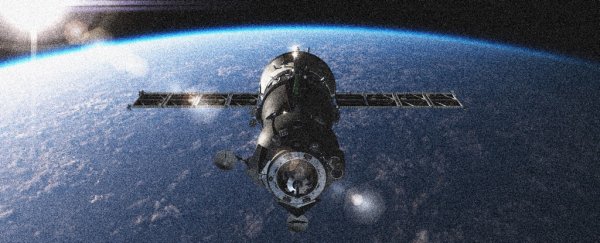High above our heads, there's a mysterious Russian satellite. And the strange way it's acting – according to the US State Department – is unlike any satellite we've seen before.
"We don't know for certain what it is and there is no way to verify it," US Assistant Secretary for Arms Control, Yleem D.S. Poblete, told the United Nations (UN) on Tuesday.
"But Russian intentions with respect to this satellite are unclear and are obviously a very troubling development."
The comments, made at the UN Conference on Disarmament in Geneva, Switzerland, come only days after the US reiterated its intentions to create a military "Space Force" by 2020, in order to "meet emerging threats on this new battlefield", although notable figures in the American space community have criticised the plan as a "dumb idea".
Despite the ongoing controversy over the Space Force's establishment, the new details shared about the mysterious Russian satellite are being offered up as a kind of proof of the so-called "emerging threats" such a military branch would defend the US against.
According to Poblete, the current fears are in response to a space object deployed by the Russian Ministry of Defence in October last year, which the Russians have described as a "space apparatus inspector".
"But its behaviour on-orbit was inconsistent with anything seen before from on-orbit inspection or space situational awareness capabilities, including other Russian inspection satellite activities," Poblete claims.
"We are concerned with what appears to be very abnormal behaviour by a declared 'space apparatus inspector'."
While Poblete does not name the specific spacecraft she is referring to, some believe she could mean a small satellite called Kosmos 2521 (Sputnik Inspektor), which was deployed from its parent satellite, Kosmos 2519, although that took place in August 2017, not October.
Regardless of whether that's correct or not, Poblete says it's too risky to simply take the Russian government at their word.
"Our Russian colleagues will deny that its systems are meant to be hostile," Poblete says.
"But it is difficult to determine an object's true purpose simply by observing it on orbit… So that leads to the question: is this, again, enough information to verify and assess whether a weapon has or has not been tested in orbit? The United States does not believe it is."
While there is no evidence other than "abnormal behaviour" to suggest the strange satellite is some kind of space weapon, the US position is that without any means of investigating the craft beyond remote observation – a limitation of the Treaty on the Prevention of the Placement of Weapons in Outer Space, the Threat or Use of Force against Outer Space Objects (PPWT) – it's impossible to dig deeper.
A senior Russian diplomat in Geneva, Alexander Deyneko, dismissed the tough talk, telling Reuters it was "slanderous accusations based on suspicions, on suppositions and so on".
For years the US government has opposed the PPWT, arguing it is "fundamentally flawed" with too many loopholes.
As to what the way forward is here, it's uncertain, but given the level of rancour on display at what's supposed to be the UN Disarmament conference, it's clear the squabbling over space won't be done any time soon.
